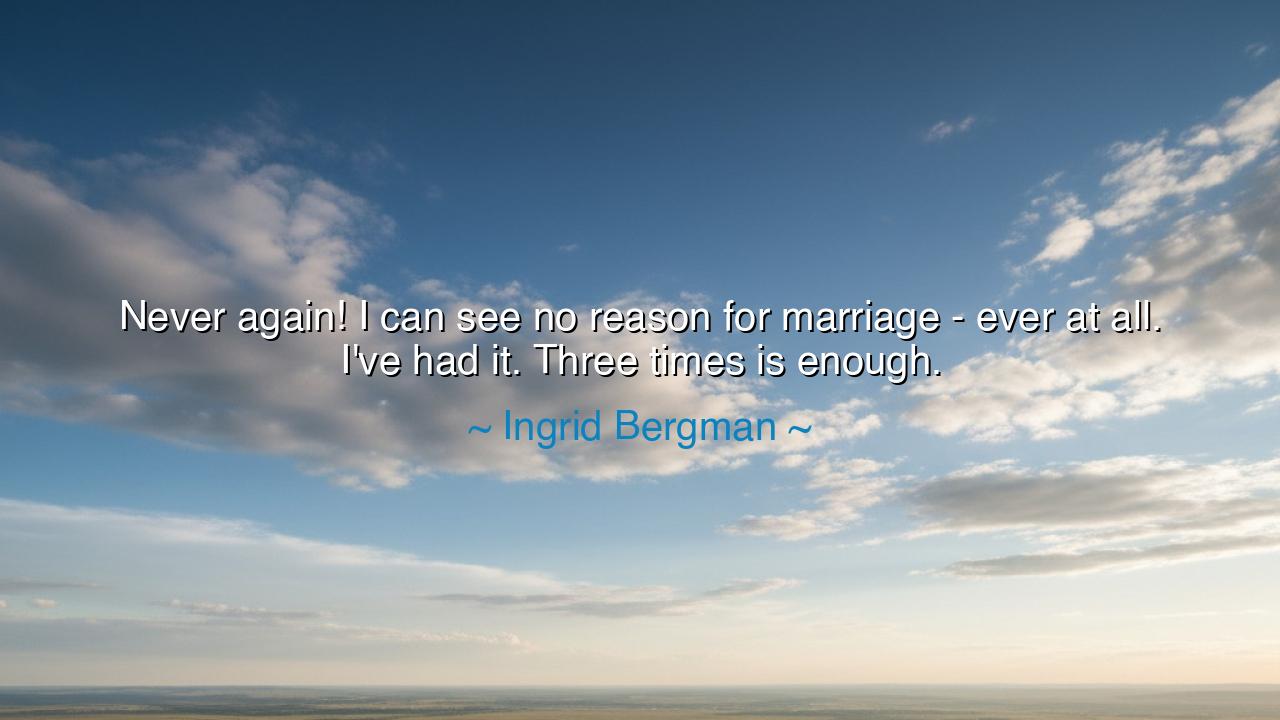
Never again! I can see no reason for marriage - ever at all. I've
Never again! I can see no reason for marriage - ever at all. I've had it. Three times is enough.






In the poignant words of Ingrid Bergman, one of the most luminous figures to ever grace the stage and screen, we hear both resignation and revelation: “Never again! I can see no reason for marriage—ever at all. I’ve had it. Three times is enough.” These words, spoken after a life marked by passion, art, and scandal, carry the weight of experience, not bitterness. They are the voice of a woman who has tasted love in all its forms—its radiance and its ruin—and who, having walked through the fire, speaks as one who knows that even beauty, when mishandled, can burn. Beneath her lament lies not cynicism, but wisdom: a recognition that marriage, for all its sanctity, can become a prison if entered without truth, and that even love must bow before the sovereignty of the soul.
The origin of this quote lies in Bergman’s later years, when she had lived fully and fiercely, and loved as deeply as few dare. Her three marriages—to Petter Lindström, Roberto Rossellini, and Lars Schmidt—were not failures, but chapters of discovery in a life lived without pretense. From Hollywood’s glittering heights to the exile of scandal in Europe, Bergman learned that romantic love, though intoxicating, is not the same as freedom. When she declared that she could see “no reason for marriage,” she was not scorning the union itself, but the illusions that often surround it—the belief that another can complete us, or that vows alone can sustain what the heart no longer believes in.
The ancients understood this truth well. In the tragedies of Greece, the gods often punished mortals not for loving, but for mistaking love’s power. Hera, goddess of marriage, was both protector and tormentor—her blessings could uplift or destroy, for she demanded not passion but endurance. Ingrid Bergman’s words carry that same duality: a reverence for love’s intensity, but a rejection of its chains. She had seen that marriage, though noble, becomes hollow when it seeks to bind what should remain free. To love without possession—that is the highest art, one that even the ancients struggled to master.
Consider the tale of Cleopatra, queen of Egypt, whose loves were legendary but whose spirit remained unconquered. She married not once, but twice, for duty, and loved beyond measure two of Rome’s greatest men, Julius Caesar and Mark Antony. Yet, in the end, she chose not to live as anyone’s possession. Like Bergman, she understood that the heart’s loyalty cannot be forced by law or ritual—it must be chosen freely, or it is not love at all. Both women—one a queen of nations, the other a queen of the silver screen—speak to the same truth: that freedom of the soul is worth more than the security of convention.
Bergman’s defiance was not born of disdain but of enlightenment. She had seen how marriage, when repeated without reflection, becomes habit, and how love, when clung to without honesty, turns to duty instead of joy. “Three times is enough,” she said, as if to remind us that wisdom comes not from the number of unions, but from what one learns within them. Her declaration is not a rejection of love, but an invitation to self-awareness—to understand that happiness cannot be anchored in another’s promise, but must grow from one’s own truth.
There is also great tenderness hidden in her words. To say “never again” is not always to curse what came before—it can also be a sigh of acceptance, a quiet acknowledgment that one has lived, loved, lost, and learned. In this way, Bergman stands not as a cynic, but as a teacher. She reminds us that experience, even when painful, is a sacred gift. Those who have loved deeply and suffered honestly are wiser than those who have never dared at all. Her life itself was proof: though she turned away from marriage, she never turned away from humanity, from art, or from love in its broader, nobler forms.
The lesson, then, is this: do not rush to bind your heart, nor despise the bonds you have once known. Marriage is a vessel—it holds what you pour into it. For some, it is a sanctuary; for others, a cage. To make it holy, one must first be whole. Seek not completion in another, but companionship that honors your freedom. And if the time comes to walk alone, do so without regret, for solitude too can be sacred. The heart that has loved and let go, as Bergman’s did, shines with a quieter brilliance than the heart that has never dared.
So let her words echo not as bitterness, but as blessing: “Never again” need not mean never to love—it can mean to love differently, more wisely, more freely. Let no soul be bound by fear or repetition. Love once, love well, and when love has taught its lesson, move forward with grace. For life’s truest vow is not to another—it is to oneself: to live authentically, to cherish deeply, and to walk the path of love with open eyes and an unbroken spirit.






AAdministratorAdministrator
Welcome, honored guests. Please leave a comment, we will respond soon